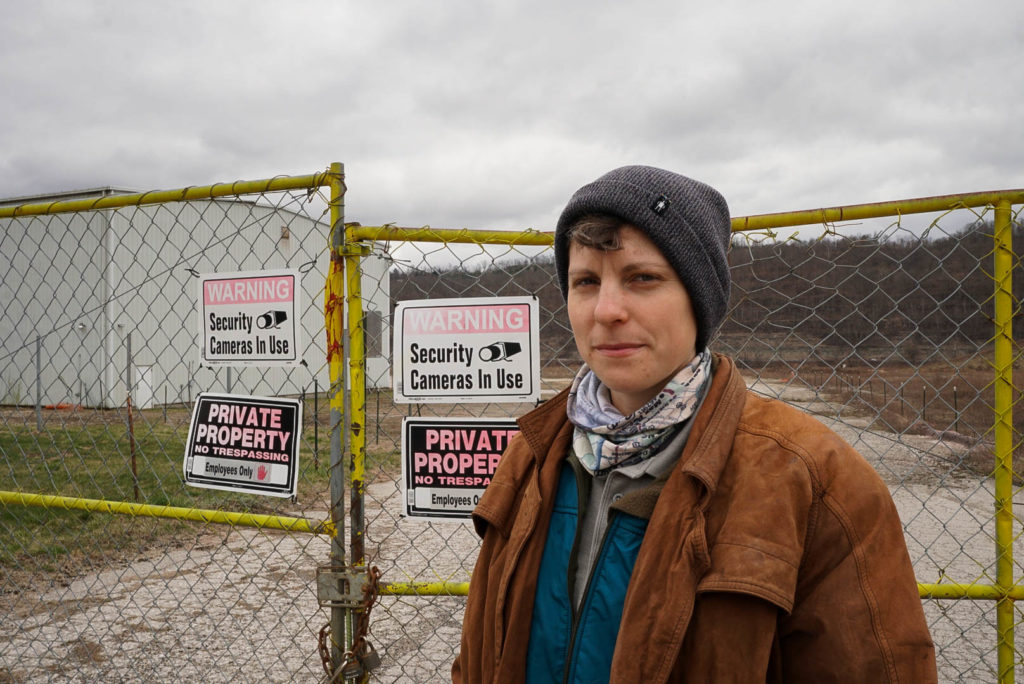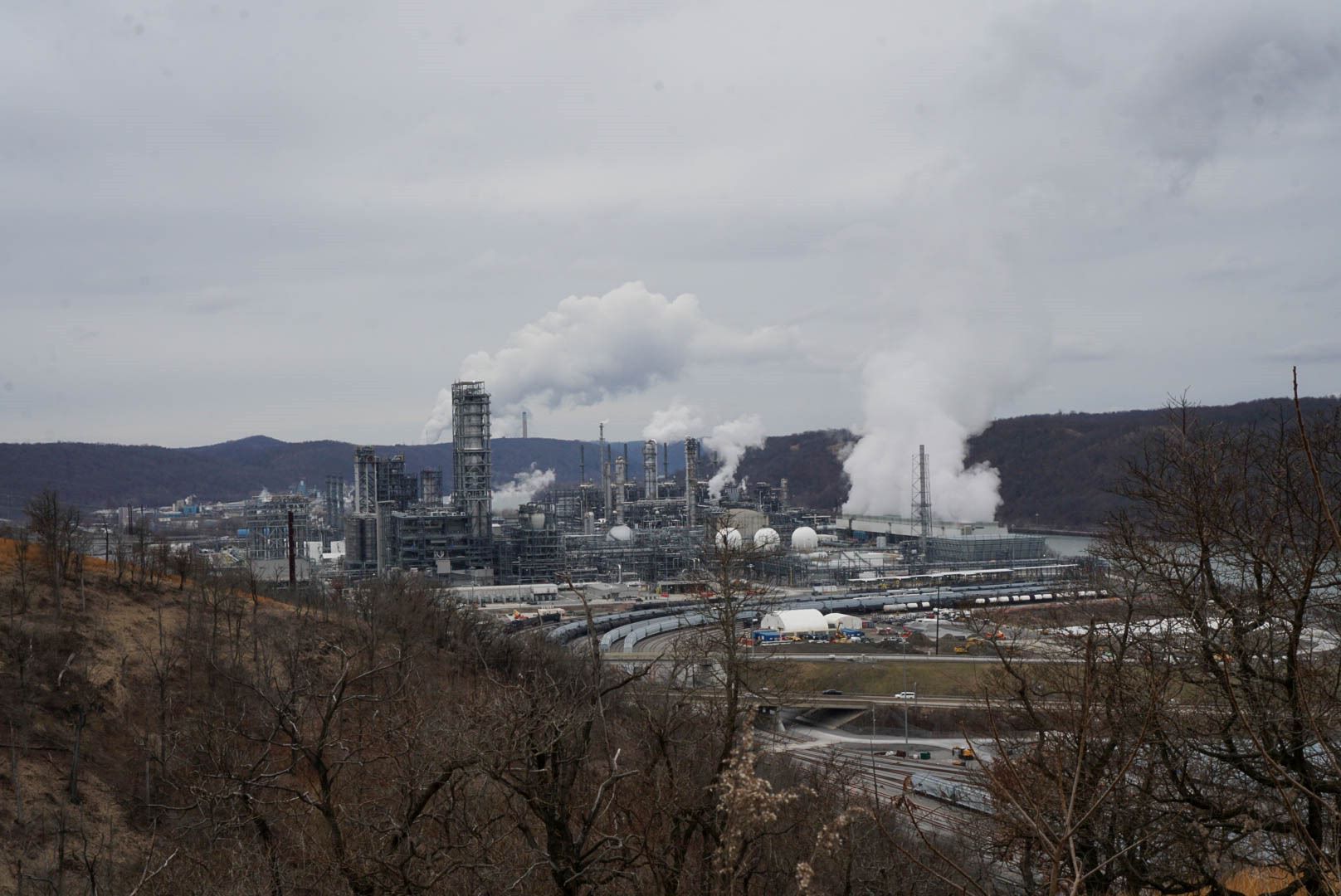Petrochemical Industry Looks to Expand in Appalachia
Written and photos by Liz Parstch
For years, Southeast Ohio has been a hub for fossil fuel jobs that the industry claims employ millions. With the rise of coal mining in the 19th century and the fracking boom of the 2000s, the industry presents its latest push: plastic production.
Now, petrochemicals have their sights on a new destination in Appalachia: Belmont County, located in southeastern Ohio, to accompany an existing plant in Beaver County, Pennsylvania.
In Belmont County, a global chemical company from Bangkok, PTT Global Chemical, has proposed plans to construct an ethane cracker plant alongside residents’ homes, shops and the Ohio River. The plant will produce plastic “nurdles,” small plastic pellets that are later used in the production of single-use plastics in other facilities.
PTT Global Chemical has currently stalled production of the plant after its second investor, Daelim Chemical USA, pulled out in the wake of the COVID-19 pandemic in 2020. However, many supporters continue to look forward to the completion of the plant.
Longtime resident of Southeast Ohio and environmental activist who holds a doctorate in environmental studies, Dr. Randi Pokladnik, has been a witness to the fossil fuel industry for years. She describes petrochemicals’ effect on Southeast Ohio as a sacrifice, one that has persisted in the industry-rich region for decades.
“People that are right there, there’s no way for them to escape,” Pokladnik says. “And that would be the sacrificed community.”
Pokladnik refers to the residents of Dillies Bottom, a quaint neighborhood located in Belmont County.
A major proponent of the plant is JobsOhio, one of Ohio’s private economic development corporations that is funded by Ohio liquor sales. President and CEO of JobsOhio, J.P. Nauseef, has strongly advocated for the plant.
According to reporting by The Intelligencer, JobsOhio has already invested millions of dollars into the site. JobsOhio initially invested $20 million into the project, which was refunded by PTT Global Chemical in March 2022 after it failed to make an investment decision in 2020.
After the $20 million was refunded, however, JobsOhio proceeded to invest $50 million more in grants and loans to support future development of the site.
PTT Global Chemical has made no comment on whether they have secured another investor or if they will continue construction on the site. JobsOhio continues to appear confident that the site will bring jobs to Ohioans.
Beverly Reed, an independent environmental advocate raising awareness about the Belmont cracker plant and the wider oil, gas and petrochemical industry, knows her area could benefit from more jobs. She describes the fossil fuel industry’s “economic promise” as more of a bluff.

“When fracking first came here, the industry lied and said it was going to create hundreds of thousands of jobs, and it was going to be the thing that bails out this area, and it’s going to be a prosperous future,” Reed says. “But nothing has changed.”
In the American Petroleum Institute’s (API) 2022 report, which relies on 2019 data, they claim that 11.3 million jobs are provided by the oil and gas industry in the United States.
According to a September 2022 study conducted by the Food and Water Watch, a nonprofit organization fighting for a cleaner environment, only 695,000 people were employed by the oil and gas industry in 2019 and these jobs have declined 37% since 2014.
Pokladnik and Reed state that a substantial number of employees who were hired at previous fossil fuel facilities in Belmont and the rest of Southeast Ohio are not residents of the area and instead come from states like Oklahoma, Texas and Pennsylvania.
“[Residents of Southeast Ohio] can’t perform the job because they haven’t been trained to do it,” Pokladnik says. “And they aren’t the right age do it.”
Reed projects that if construction of the petrochemical facility were to be completed, nearly half of the promised jobs would not come to fruition as the projected numbers are likely overinflated.
“I’m pretty sure we can come up with different ideas to create 200 jobs that don’t kill us,” Reed says.
The infrastructure needed to operate the ethane cracker plants and produce plastic poses serious environmental and health hazards. The adverse effects of these systems can already be seen in Beaver County, Pennsylvania where one plant is currently in operation: the Shell Polymers Monaca Cracker Plant.
The plant officially began operations on Nov. 15, 2022 and will remain in its startup phase for roughly a year until it becomes fully functional in late 2023, according to WTAE Pittsburgh.
To monitor the harmful effects brought about by the cracker plants, Beaver County Marcellus Awareness Community (BCMAC), an environmental awareness group, created Eyes on Shell.
Eyes on Shell is a community watchdog group for citizens of Beaver County to report concerns and observations related to the new Shell cracker plant.
A volunteer with Eyes on Shell spoke anonymously about being notified of the health effects of petrochemicals back in December 2021 at a virtual community meeting hosted by BCMAC called Preparing for Petrochemicals. During the meeting, Beaver County residents were asked to keep a health journal ahead of the plant’s arrival to monitor any impacts it could have on their health.
Since the plant came online, numerous residents have reported experiencing light pollution, noise pollution and air pollution to Eyes on Shell.
The volunteer specifically draws attention to Brighton Township, which is prone to loud, incessant popping noises at all hours of the day and night. Shell denies these noises come from the plant.
“There was one [incident] recently on the 20th of January, which actually coincides with a malfunction report from Shell,” the volunteer says. “But Shell denied that they were the source of the noise. It frightened a number of people and shook their homes.”
She draws attention to light pollution, specifically “flaring events” that are so strong and frequent, they can be seen 15 to 17 miles away. Many residents have been adding blackout curtains to their grocery list in an attempt to block out the light, according to the volunteer.
Taking all these disturbances into consideration, the volunteer states the unknown health effects of the air pollution from the facility are concerning to residents. She mentions that adverse health complications will impact surrounding communities and likely cross state lines into Ohio and West Virginia.
Since the cracker plant has only been online for several months, the full-scale health effects could take years to come to light. Residents have already noticed odd smells around their community and reported experiencing headaches and episodes of nausea, a possible side effect of the plant’s operation and emission of volatile organic compounds (VOCs).
In its first month of operation alone, Shell nearly exceeded their entire 12-month emissions limit of VOCs, emitting approximately 512 out of a maximum of 516 tons.
Shell claims this was due to the initial startup of the facility, however, they have continued to exceed their limit since then. Several environmental groups, including Environmental Integrity Project and Clean Air Council, have filed multiple lawsuits against the plant in attempts to hold them accountable. The Pennsylvania Department of Environmental Protection (DEP) has yet to take action.
“Having people who can’t sleep, having to reassure your kids [about] the loud noises they are hearing, that’s not safe,” the volunteer says. “Is Shell operating safely? Perhaps in some ways, but there are a number of ways that they can improve. They’ve been called on by the community to [do] that. And we’re still waiting.”
As Eyes on Shell and other environmental groups wait for the Pennsylvania DEP’s response, the community awareness group continues to work to keep residents informed via Facebook and provide residents with a safe space to voice their concerns.
The volunteer, who has lived next to the operational facility for roughly five months, says that despite all the disturbances, her biggest fear is that one day her and her family may need to leave their home.
“My husband and I have go-bags,” the volunteer says. “We understand what our evacuation route is because the nuclear facility is just down the river. It’s a different way of living. Neither of us have ever had to really be that concerned about living near a facility or industry like this. And now it’s just something that dominates your day-to-day life.”
In Belmont, petrochemical production promises to provide hundreds of jobs for the region. In Beaver County, however, residents speak of disturbances that affect their day-to-day life. The question remains: Do the benefits outweigh the costs?
Update: On April 25, 2023, Shell announced they would be temporarily ceasing operations at the plant to work on its flare and wastewater treatment system. Eyes on Shell is pleased to see the company addressing residents’ concerns.
SEO
Related posts
What’s Inside
- Behind the Bite (68)
- Features (124)
- In Your Neighborhood (102)
- Photo Essay (4)
- Read the Full Issue (8)
- Talking Points (48)
- The Scene (15)
- Uncategorized (3)
- Web Exclusive (5)
- What's Your Story? (21)


Find us on Social Media